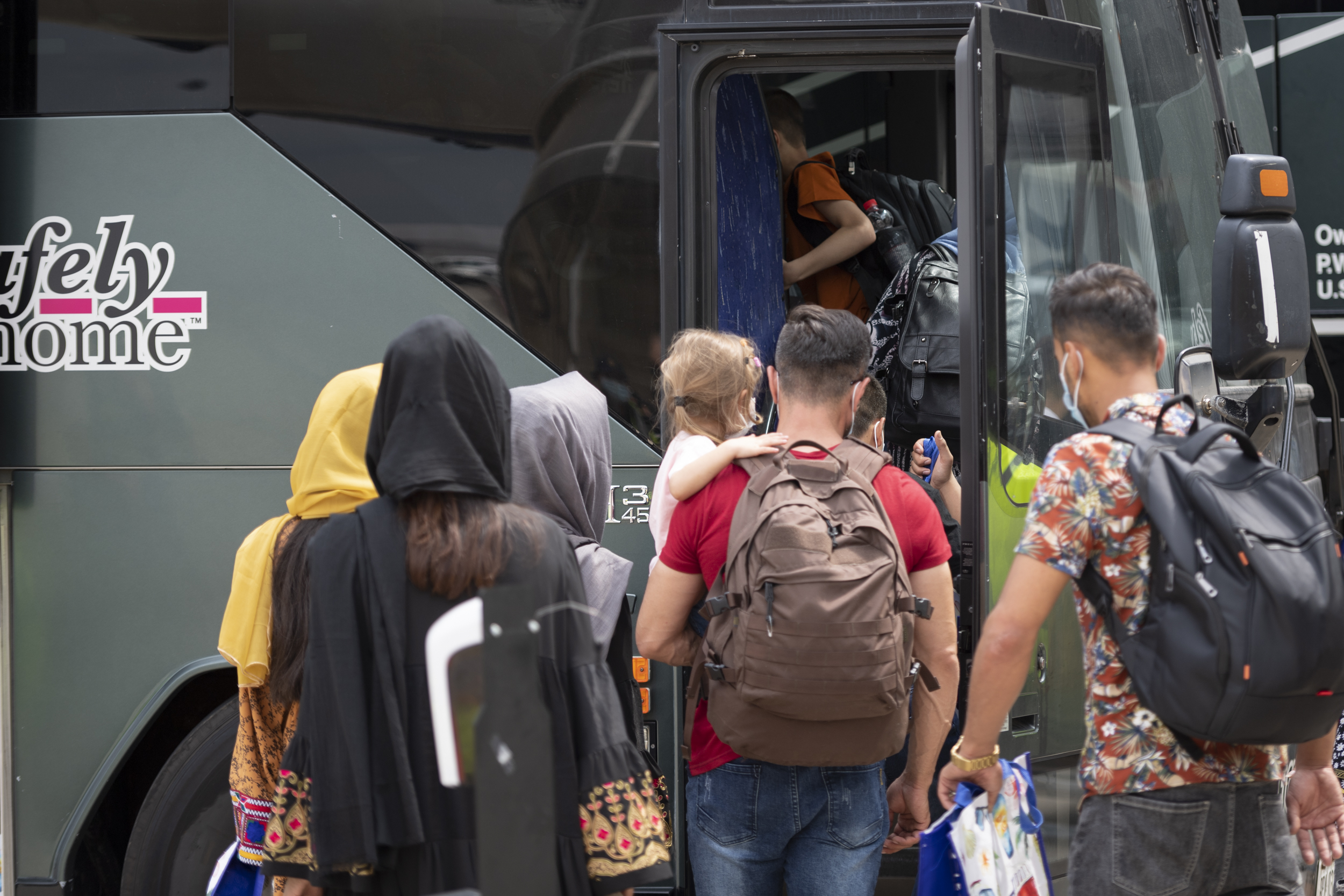As flights begin to touch down on tarmacs, bringing Afghan refugees to Canada, advocates say the federal government urgently needs to revise its current resettlement programs to better meet the needs of Afghans left in precarious situations.
“The crisis in Afghanistan will be an opportunity for the government to recognize that they have [additional] tools that are available to them,” said Janet Dench, the executive director with Canadian Council for Refugees (CCR), in an interview with New Canadian Media.
“Maybe they will see that [a] more flexible use of the temporary resident permit could be [one] good solution, not just in this particular crisis, but in many other situations.”
In July 2021, the federal government announced a special immigration program for Afghan nationals whose work included “a significant or enduring relationship with the Government of Canada.” This includes Afghans who have worked as interpreters with the Canadian Armed Forces and current or previous local staff of the Embassy of Canada to Afghanistan.
An expanded resettlement program was announced by Immigration, Refugees and Citizenship Canada (IRCC) on August 13. A special humanitarian program is now open to Afghan nationals outside the country with no durable solution in their current location. This includes women leaders, human rights advocates, journalists and people who assisted Canadian journalists, persecuted religious minorities, LGBTI individuals, and their immediate family members.
The program is also open to family members in Afghanistan of people who assisted the Government of Canada who have already been resettled in Canada. In addition, IRCC has committed to prioritizing family sponsorship applications and temporary resident extensions for Afghans currently in Canada.
Recommendations Provided to Government
In their recent recommendations to the Canadian government, CCR highlighted the need for a more transparent way for Canadians – especially those of Afghan descent – to “name people in need of urgent protection” for consideration in these resettlement programs.
In addition, the time it takes to complete the necessary documentation, as well as challenges to fulfill requirements like medical exams and biometrics, are significant barriers for at-risk individuals to access resettlement programs.
CCR has urged the government to provide eligible family members with temporary resident permits so they can leave quickly, and the processing of their applications can be completed in Canada.
Dench said temporary resident permits are also needed to alleviate processing barriers for people who have managed to get out of Afghanistan but are now in precarious situations in another country.
CCR has also called for the definition of “family,” and the proof required, to be more flexible. For example, program regulations state a dependent child must be under 22 years old to qualify. Still, Dench wonders what will happen to families coming to Canada with a 23-year-old daughter, for instance? How could they leave her behind?
Coordinating Resettlement
The Canadian government’s target of resettling 20,000 refugees will be a two-year project involving a combination of Government-Assisted Refugees, privately sponsored refugees and community sponsored refugees, said Fariborz Birjandian, CEO of the Calgary Catholic Immigration Services (CCIS). Birjandian is leading the recently created National Afghan Refugee Steering Committee.
Birjandian said 6,000 people who have been working with the Canadian government in Afghanistan have already been approved for resettlement – although not all have yet been able to leave – and the remaining 15,000 will be resettled under the humanitarian program. Key stakeholders in four regions have been engaged to support this process, including 32 organizations across Canada with a track record of assisting refugees.
This target number is far too low, said the Afghan Association of Ontario (AAO), which has been providing settlement, and adaptation services to the Afghan community for almost 40 years.
In a joint open letter to the Canadian government, the AAO calls for a minimum of 95,000 people to be resettled.
They have also requested the appointment of a high-level special envoy to oversee evacuation and resettlement efforts “to improve communication, avoid inefficient duplication and ensure coherent, expeditious decision-making.”
CCR has also called for the 20,000 refugees to be added to places already committed to in the immigration levels, rather than simply processing applications of Afghans already in the immigration queue to fill some of these spaces. So far, the government has only committed an additional 8,000 places designated for Government-Assisted Refugees.
Resettlement Needs
As of August 25, more than 1,500 Afghan refugees have landed in Toronto, Birjandian tells New Canadian Media. They are currently undergoing medical exams and COVID testing before being taken to other locations.
But many other Afghans have not been able to leave.
The Canadian Association of Journalists (CAJ) and the Canadian Journalists for Free Expression (CJFE), along with the support of multiple Canadian news organizations, for example, have gone to great lengths to provide the information Canadian officials would need to ensure safe passage for Afghan journalists and support staff who assisted Canada. Canada’s evacuation ended, officially, on August 26, but dozens of people remain trapped in Afghanistan, facing imminent threat with no foreseeable way out.
Where in Canada people will live depends on various factors, including having close ties to a certain community as well as overall settlement needs. The refugees who have already arrived speak Dari or Pashto; some are professionals who speak English well because of their work as interpreters, and others are people such as bodyguards and cooks who worked as support staff. Forty percent of the refugees who have arrived are children.
“These people … just left their home and they got lucky to get on the plane and just fly out,” says Birjandian. “So, everybody can imagine what state of mind they could be [in].”
As a refugee to Canada himself, Birjandian relates to feeling grateful for being safe while at the same time knowing you have left your home with nothing but the clothes on your back. He said it’s important to make sure people in the host community are welcoming so Afghans can find a safe place for their families.
Canada’s Responsibility
There has been “overwhelming support” of Canadians wanting to help Afghan refugees, Birjandian said.
“We appreciate that, but we just urge them to be patient with us until things are sorted out and they will be connected,” he added.
Dench said the urgent assistance needed by Afghan refugees should not lead to processing delays for applicants of other nationalities, many of whom have been waiting for years.
“A lot of resources were diverted to respond to the Syrians,” Dench said. “Everybody’s happy that we did that, but it’s completely unfair to, say, African refugees who have been waiting already for a very long time, and to make them wait even longer. And, unfortunately, that is partly what happened.”
Dench said African refugees, for example, are often neglected because of security and communication challenges in their countries, cited by the Canadian government as barriers to processing.
In her view, Canada’s ability to expediently process Afghan refugees despite the volatile situation in Afghanistan shows that “if you have the will to find ways around and make it a priority then, then you do find ways to solve things.”
She feels the current situation presents an opportunity for the government to revise their procedures to become more efficient.
At the same time, Dench said Canada’s experience in assisting the Syrian refugees in 2015-2016 has created additional capacity within the settlement sector, reinforcing “the system of welcome” that will serve the country well in the process of resettling the 20,000 anticipated Afghan refugees.
On August 27, Foreign Affairs Minister Marc Garneau announced that Canadian diplomat David Sproule, a former ambassador to Afghanistan from 2005 to April 2007, will now serve as a special envoy for Afghanistan.
People interested in assisting in Afghan resettlement in Canada can find out more here.
Daniela Cohen is a freelance journalist and writer of South African origin currently based in Vancouver, B.C. Her work has been published in the Canadian Immigrant, The/La Source Newspaper, the African blog, ZEKE magazine, eJewish Philanthropy, and Living Hyphen. Daniela's particular areas of interest are migration, justice, equity, diversity and inclusion. She is also the co-founder of Identity Pages, a youth writing mentorship program.





